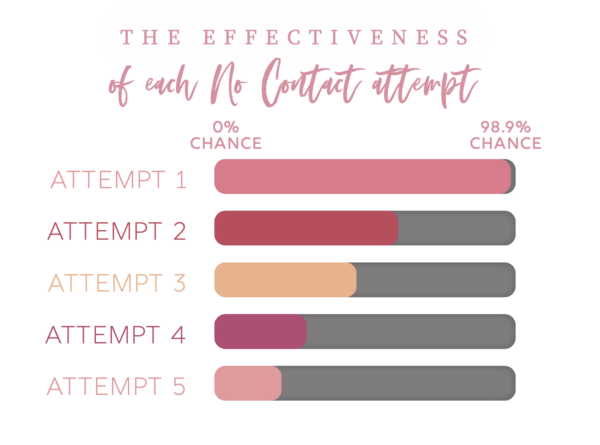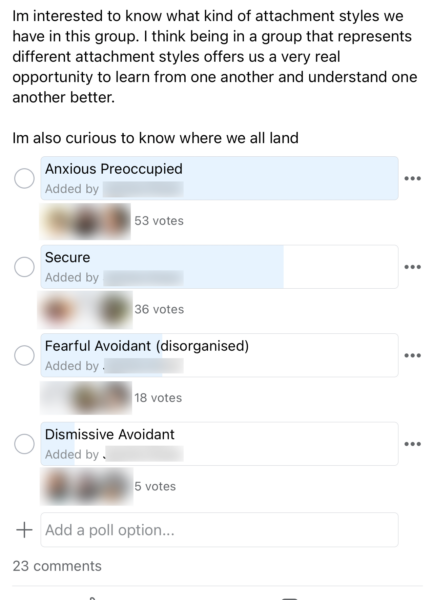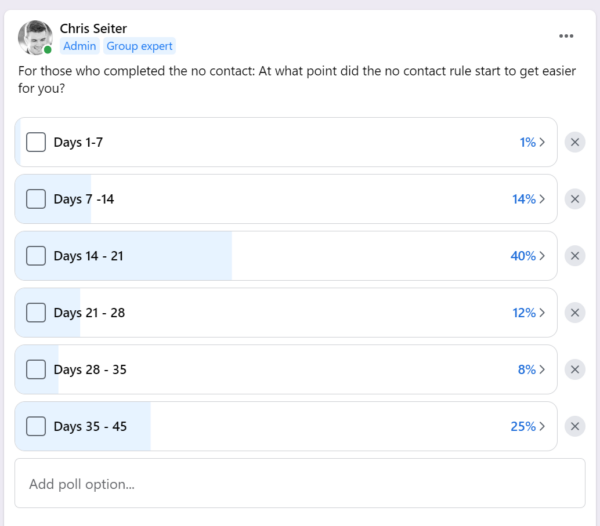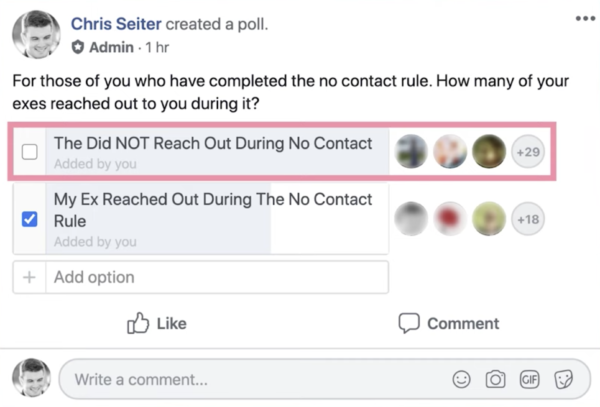Today we’re going to talk about if the no contact rule ever gets any easier.
I think our statistics have shown that most of the people that come through our program end up failing the no contact rule at least one time.
What does that mean?
Well, usually what that means is that people attempt a no contact rule and then before their self imposed time limit is up they break it and contact their ex.
(Despite knowing the clear consequences of doing so.)
But it’s more than that.
The no contact rule is arguably one of the more difficult things that you’re doing for the very reasons that it’s successful.
Not only are going to be talking about that today but I’ll be taking you through:
- Why no contact is such a struggle
- Exactly when you can expect it to get easier (with real life data)
- The importance of shifting your no contact mindset to one of letting go
- Why you should embrace the grind
Let’s begin!

What Are Your Chances of Getting Your Ex Boyfriend Back?
Take the quizWhy The No Contact Is Such A Struggle
We’ve discovered that our average client base exhibits what I refer to as an anxious attachment style.
We’ve also found a link between anxiety, this attachment style, and codependency.
The troubling aspect of the codependent nature of an anxious attachment style lies in the fact that individuals often feel they can’t live without the person they’ve lost.
I don’t usually mean that literally, but in some cases, people do interpret it that way.
Thus, asking someone wholly reliant on another person’s attention and love to essentially ignore that person can be challenging. Even for those who accept it, it can remain a hard sell for approximately 45 days.
However, here’s the thing.
The no contact rule gets easier over time.
This topic brings to mind an article I wrote last year in which I aimed to identify the hardest day of the ‘no contact’ rule.
In that piece, I argued that the most challenging time is immediately after initiating the rule.
Following this, there will be intermittent valleys of struggle. Clearly, you grapple with the no contact rule right after you start, but for those practicing limited no contact, even brief interactions before reverting back to the rule can be incredibly taxing.
Then there are the days when you don’t hear from them at all. Self-doubt begins to creep in and the rollercoaster effect takes hold. One moment, you feel like you’re doing really well, and then silence causes a plunge into depression that could potentially spiral out of control. Yet, it does get easier, and that’s an important truth to remember.
To validate that it indeed becomes less difficult, I turned to the experts.

What Are Your Chances of Getting Your Ex Boyfriend Back?
Take the quizExactly When You Can Expect It To Get Easier
The experts, of course, being the actual people who’ve done a no contact rule before.
So I basically went to our community and I said, hey, for those of you who have completed a no contact rule, at what point did the no contact rule start to get easier for you?
I created this poll with six potential answers and I divided these answers up within a 45 day timeframe.
So, if you don’t know, here at Ex Boyfriend Recovery we are big fans of three timeframes of no contact.
- The 21 day rule
- The 30 day rule
- The 45 day rule
But I wanted to kind of stretch it out and give it every opportunity to be successful.
So I just simply divided six potential answers up into a 45 day max limit, if you will.
- Days 1-7: 1%
- Days 7 – 14: 14%
- Days 14 – 21: 40%
- Days 21 – 28: 12%
- Days 28 – 35: 8%
- Days 35 – 45: 25%
Basically 85% of the vote says that no contact started to get easier around days 21 – 45. With the sweet spot settling right around the 3 week mark.
I think this is for a lot of reasons.
The Importance Of Shifting The Point Of No Contact
Many times, I believe, people overlook the true purpose of the ‘no contact’ rule.
I’ve frequently discussed how individuals are often enticed by the prospect that the rule may make their ex miss them. However, ironically, if one employs the no contact rule with the sole intention of making their ex miss them, it tends to have the opposite effect.
Proof of that here:
Those who approach the rule intending to grow past or even let go of their ex are often the ones who end up eliciting the ‘make your ex miss you’ response.
This concept was perhaps best illustrated by a respondent to our poll.
This particular individual mentioned that after initiating the no contact rule,
It’s been awhile, but I think it got gradually harder through week 3 but then got pretty easy. I think it probably relates to forming habits, as well as the reinforcement from achieving trinity goals along the way. By the end, I felt an urge to stay in NC to finish off some trinity goals I hadn’t quite hit yet.
This focus on habit formation and ‘Trinity’ goals is often overlooked by many.
Often, we obsess over what our ex is doing during the ‘no contact’ period.
However, this person’s experience provides valuable insight – the most effective way to implement the ‘no contact’ rule is to focus entirely on yourself. Center it around your goals, forming healthy habits, and embracing the journey of self-improvement.
Embrace The Grind
The no contact rule is hard work and the one universal thing that I’ve learned about people is that they are afraid of hard work.
They’re afraid of embracing the grind.

What Are Your Chances of Getting Your Ex Boyfriend Back?
Take the quizHave you ever felt like this before?
You wake up and you just don’t want to get out of bed, you just want to lay there all day and not start the grind because you know there’s hard work ahead of you and maybe whatever free time you’re looking forward to is going to be so minimal that it just feels like it’s not worth it.
And so you just sort of don’t do anything.
You pause, you freeze, you sit there and kind of lament about how your life kind of sucks.
I’ve noticed that mentality with the no contact rule a lot where you allow it to take control.
You allow it to throw you into depression.
And that’s because the no contact rule is hard work.
It’s hard to be disciplined.
It’s hard to not contact an ex when you so badly want to contact them. But I think the important thing is that not doing it or failing to have the discipline will end up fostering more self-doubt and depression.
So inaction fosters self-doubt and depression. Yet action, doing the no contact rule, focusing on your own goals, creating healthy habits, that’s where accomplishments can happen. And accomplishments equal confidence. And that’s the whole point of the no contact rule.
It’s about taking action about the elements of your life that you would like to improve outside of your ex and allowing those elements to create confidence within you.
People are always asking me, well how do I be more confident?
How do I make my ex more attracted to me?
Accomplish something that you’re proud of. Something that your ex will envy. And then all of a sudden the dynamic shifts from, “oh I could have had her or him whenever I wanted” to, “oh my goodness I might have made a mistake.”
That’s what it’s all about.
And that to me is why the no contact rule can be so difficult.
Because that grind, you actually have to seek it out and embrace it. You have to do the things that you don’t want to do.
But if you do them and you’re successful and you slowly start getting these accomplishments under your belt, you slowly start getting more confidence. And that confidence starts attracting more people.
And sometimes your ex can see those people getting attracted to you and it raises your value and they start thinking, oh I might have made a mistake and they start coming back into the picture.
And the irony is usually when you do this you don’t want them back anymore.
But from my mind, that’s a win-win




